Geminids 2004
The 2004 return of the Geminid meteor shower proved to be one of the
strongest ever recorded. Observers under a dark sky were treated to a show
of almost 3 Geminids per minute at the time of the peak. In Slovenia the
weather conditions were poor. During much of the activity period most of
the country was under a thick layer of fog and low clouds. Thus many
observes missed the show. Those who climbed above the cloud layer (over
1200 m), however, were treated to a spectacular show of bright meteors
under a pristinely dark sky.
OBSERVATIONS
Over 4 days of activity before and during the peak, Javor Kac obtained a
series of observations from Kisovec (at 1250 m a.s.l.) under very dark
skies, totaling 1101 meteors over 12.71 h teff. On December 12/13, one
night before the peak, the Geminid rate already reached 83 meteors per
hour! The peak night was very active with 660 Geminids observed in 4.78 h
teff, making the average hourly rate 138 Geminids per hour!
Jure Atanackov observed from the Coast, where the skies were clear. Under a
LM6.5 Bortle class 4 sky, he observed 253 Geminids in 1.50 h teff, with the
top hourly rate 179 Geminids! Several fireballs were observed, with one
spectacular -3m green Geminid close to the radiant leaving a 7-second
twisting train!
Observing from Jelovica, above the thick cloud layer, Jure
Zakrajsek observed a rain of Geminids, estimating the rate to be above 100
per hour. He photographed a number of meteor trails over 1.5 h, comparing
the photographic rate of Geminids even with the Leonids of 2002!
Table 1: Observers participating in the Geminids 2004 campaign.
ANALYSIS
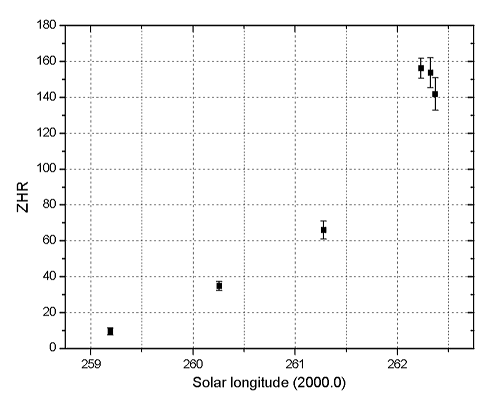
Figure 1: ZHR profile of the Geminids 2004.
157 meteors were used for the radiant calculation. The radiant is located at a = 111.9 and d = 33.2 (l¤= 261°) (Figure 2).

Figure 2: Radiant position of the Geminids 2004, obtained from photographic observations.
Geminid photos, in chronological order
Photographed from Jelovica (Jure Zakrajsek) and from Kisovec (Javor Kac).
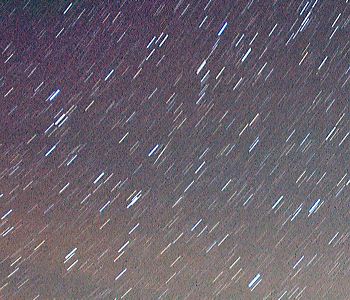
A fairly bright Geminid in the center. 293 sec exposure starting at 23:38:31 UT. Photographed with Nikon D-70 digital camera. Photo: Jure Zakrajsek.
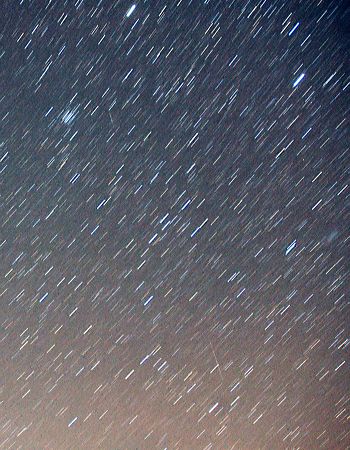
Two Geminids caught on one frame. 260 sec exposure starting at 00:20:28 UT. Photographed with Nikon D-70 digital camera. Photo: Jure Zakrajsek.

A Geminid meteor cutting through Orion. Exposed from 002714 to 003855 UT with 37/2.8 lens on Fuji 800 film. Photo: Javor Kac.
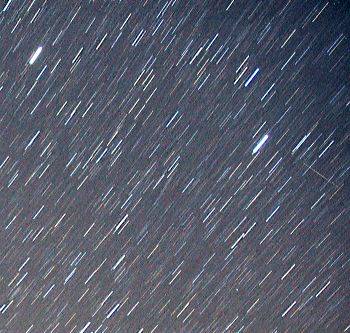
Another faint Geminid. 287 sec exposure starting at 00:33:17 UT. Photographed with Nikon D-70 digital camera. Photo: Jure Zakrajsek.
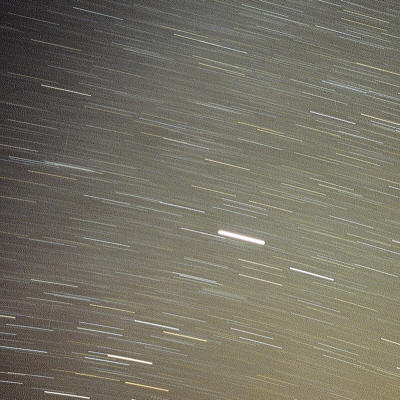
Three faint Geminids were caught in one frame. Exposed from 003906 to 005209 UT with 37/2.8 lens on Fuji 800 film. Photo: Javor Kac.
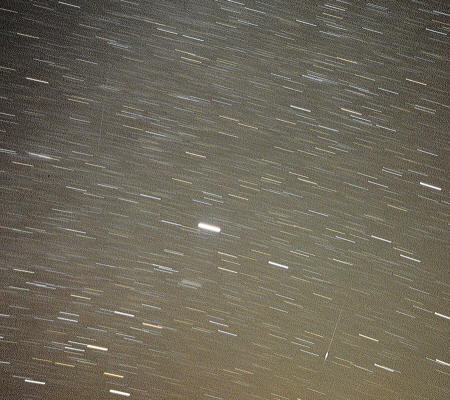
Geminid at left and a bright sporadic meteor with a terminal burst. Exposed from 005221 to 005808 UT with 37/2.8 lens on Fuji 800 film. Photo: Javor Kac.
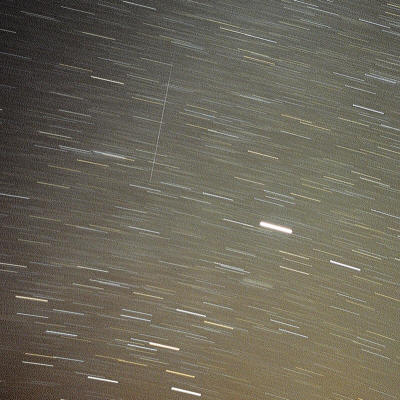
Geminid above Canis major. Exposed from 005822 to 010720 UT with 37/2.8 lens on Fuji 800 film. Photo: Javor Kac.
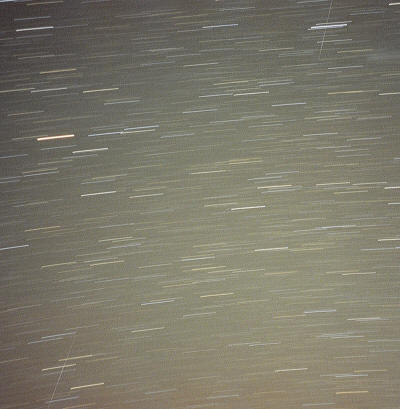
Two Geminids caught on one frame. Exposed from 012122 to 012902 UT with 58/2 lens on Fuji 800 film. Photo: Javor Kac.
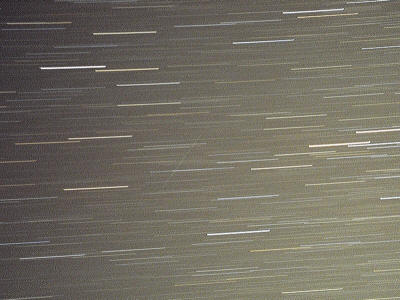
A faint Geminid. Exposed from 012923 to 014017 UT with 58/2 lens on Fuji 800 film. Photo: Javor Kac.
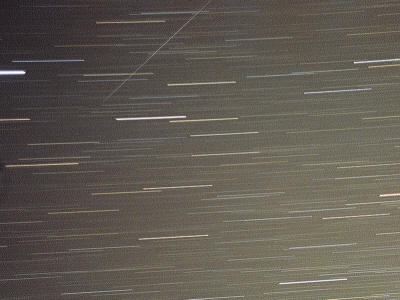
Geminid meteor. Exposed from 014031 to 015235 UT with 58/2 lens on Fuji 800 film. Photo: Javor Kac.
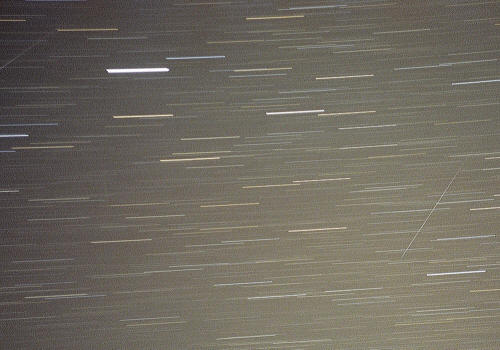
Two Geminids caught on one frame. Exposed from 020702 to 021721 UT with 58/2 lens on Fuji 800 film. Photo: Javor Kac.
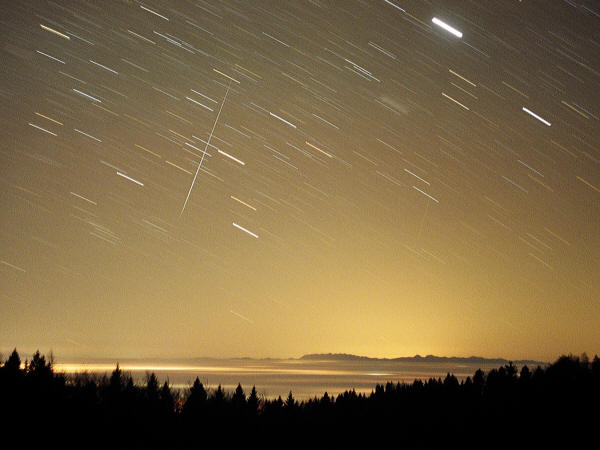
A bright Geminid and another fainter one close to the horizon. Exposed from 031924 to 032507 UT with 58/2 lens on Fuji 800 film. Photo: Javor Kac.
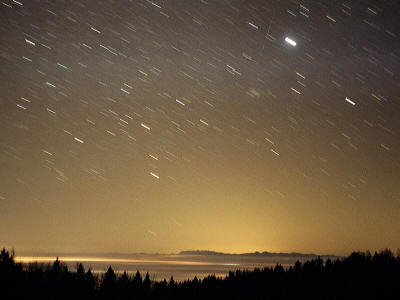
A faint Geminid close to Sirius. Exposed from 032522 to 032804 UT with 58/2 lens on Fuji 800 film. Photo: Javor Kac.
The text, figures and photos on this page are © 2004 by the MBK Team.
| 












